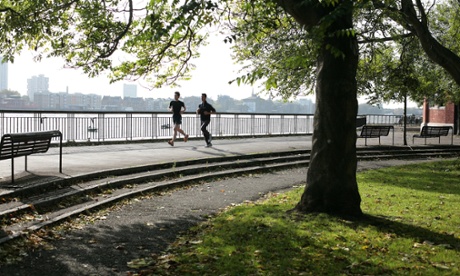
Earlier this year I started my own running blog, Running the Line, joining the hordes of other wannabe runner-writers and the thousands of running-related websites. The experience itself has made me reflect upon the nature of the relationship between writing and running.
Judging by the explosion of running bloggers sharing their race reviews, training programmes and advice on staying motivated, the activities are inextricably linked. And perhaps part of an explanation for this stems from the similarities between running and writing: it is common to see both pursuits attracting descriptors such as discipline, perseverance, and endurance. These reflect the perspiration required, as well as the importance of making them part of your routine. You know that some days will be more challenging than others, when you’ll stare at a blank screen for hours – or the prospect of lacing up your trainers feels like a chore. Sometimes running, like writing, is a slow and incremental process. It’s a case of putting one foot in front of the other, and using words to move from one point on a journey to another.
Novelist Haruki Murakami explores these intertwined fascinations in his book, What I Talk About When I Talk About Running, attributing “most of what I know about writing fiction I learned by running every day”. On the one hand running is about constantly striving for new challenges, setting fresh goals, and completing longer distances. On the other we express how this makes us feel through our words.
Drawing upon my own personal experience, running for me helps to create a productive space for “mind wandering”, where creative thoughts crystallise and ideas incubate. On a long run, mentally I am able to envision whole sentences and paragraphs with a cognitive flexibility that I rarely have when sitting behind a desk.
Historically there are a number of writers who also claimed running facilitated the creative process. American novelist Louisa May Alcott was reportedly a devoted runner, whilst fellow countrywoman Joyce Carol Oates ascribes the twin activities of running and writing to “keep the writer reasonably sane and with the hope, however illusory and temporary, of control”.
The philosopher Henry David Thoreau, meanwhile, wrote “the moment my legs begin to move my thoughts begin to flow”. Others have used running as a metaphor to explore ideas. Struck by the serene calmness of a young man bedecked in a running vest and shorts trotting past his cottage, Alan Sillitoe wrote down two alliterative lines of verse. These went on to form the basis of the short story The Loneliness Of The Long Distance Runner.
Anecdotally, literature suggests that creative people sometimes use physical activity to overcome mental blocks and a dearth of inspiration. More scientifically, several studies have implied a connection between aerobic exercise – which increases the flow of blood to the brain – and enhanced mental capacity, though the evidence remains inconclusive. Earlier this year a study by Oppezzo and Schwartz demonstrated that walking boosts “creative ideation” both in real time and shortly after, although the authors tentatively suggest that other mind-freeing activities (eg knitting) may have similar effects.
An alternative interpretation underlines the introspective nature of both running and writing;that both need focused concentration. Running, like writing, is an intensely solitary pastime, which itself creates a space to think.
Returning to my own runner/blogger experiences, the mindset of determination and routine has become an important aspect of the creative process. On one occasion when I was out running I was consumed by an outpouring of free-flowing prose. On arriving home I immediately grabbed my notepad, furiously jotting down the words tumbling out of my brain onto the sweat-soaked paper. When creativity flows, it really flows. Just like an invigorating run – the type that unclutters your head, and causes your mind to wander through new questions and curiosities.
Of course the idea that creativity is an abundantly available resource merely waiting for the correct application (eg physical exercise) to extract it ultimately feels deterministic. There have been occasions when, regardless of the distance, I’ve simply run out of steam, colliding head-on with the creative wall. Similarly there have been times when I simply haven’t felt like running. But these moments have been fleeting, and the commitment to regularly write new content for my blog has gone a long way in silencing the routine internal monologue as to whether to pound the pavements or find something more appealing to consume my leisure time.

